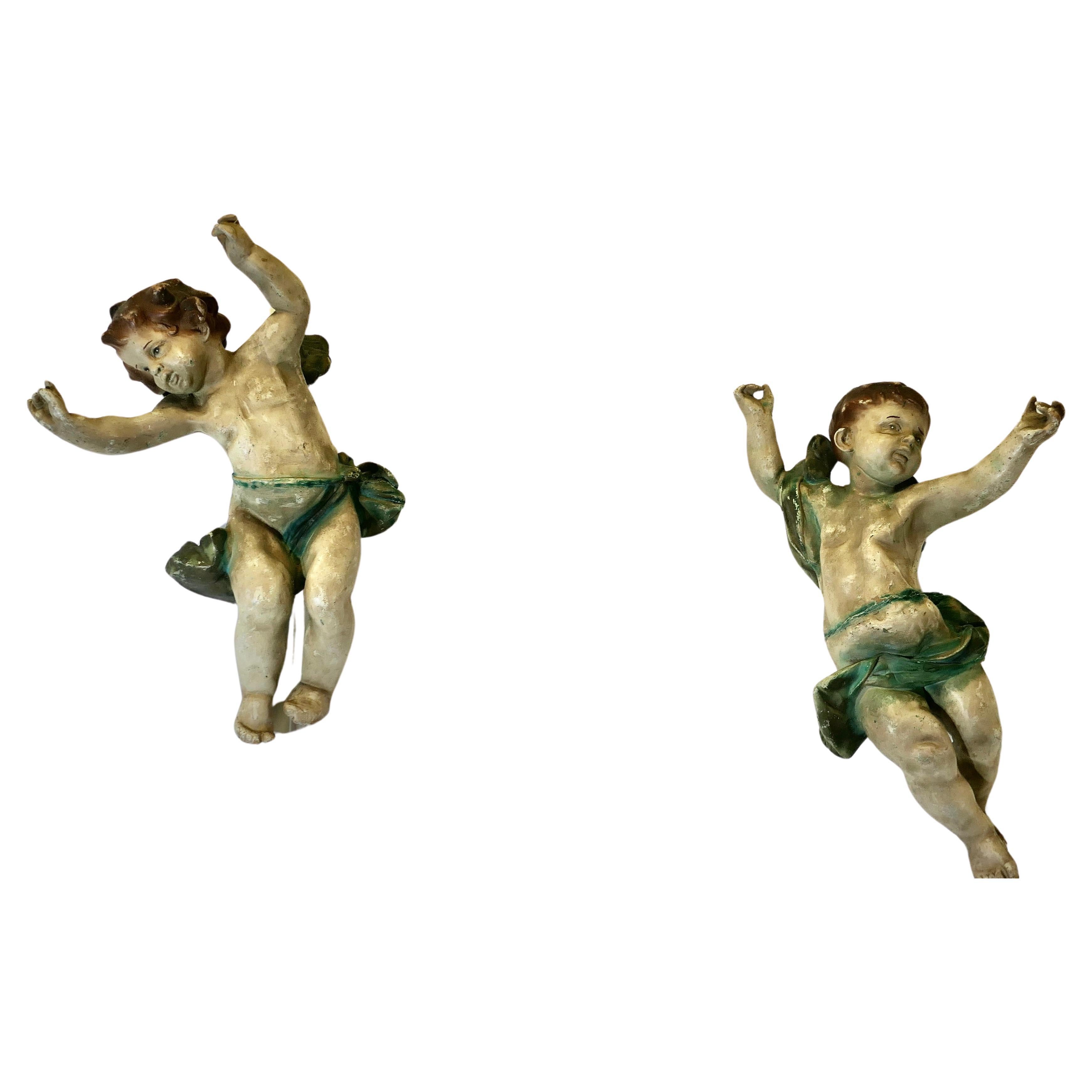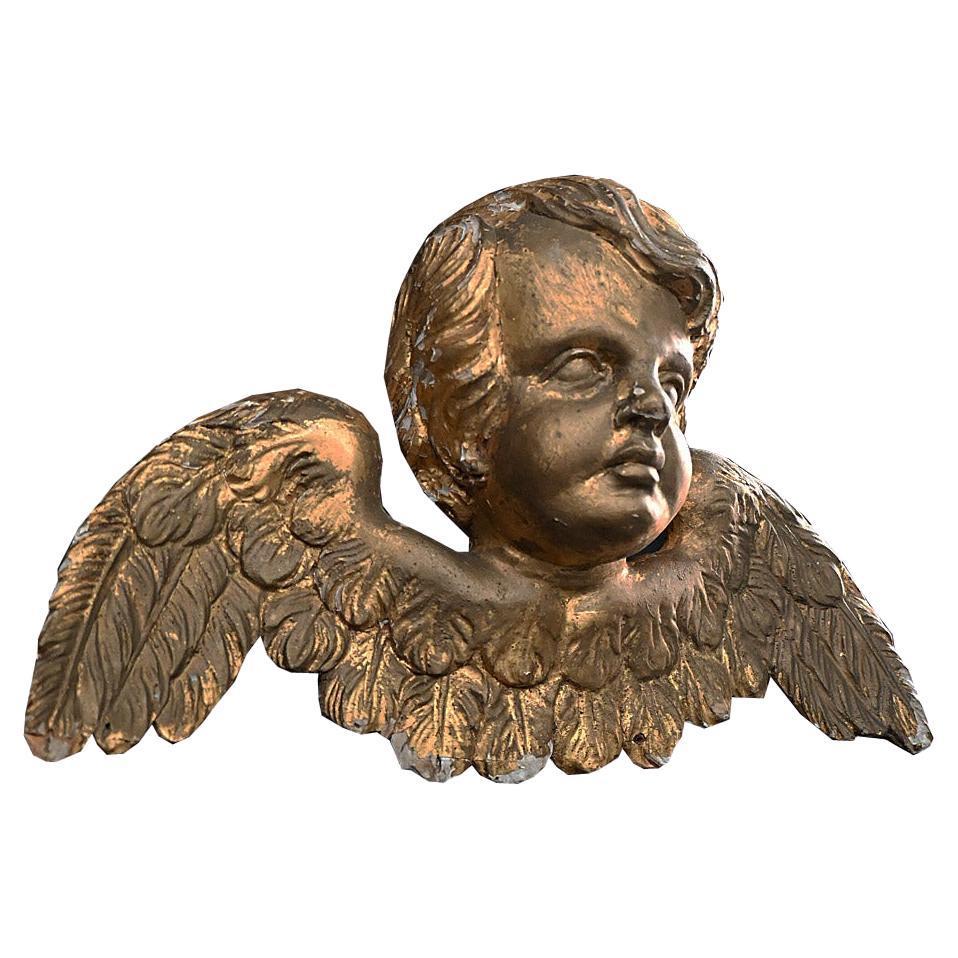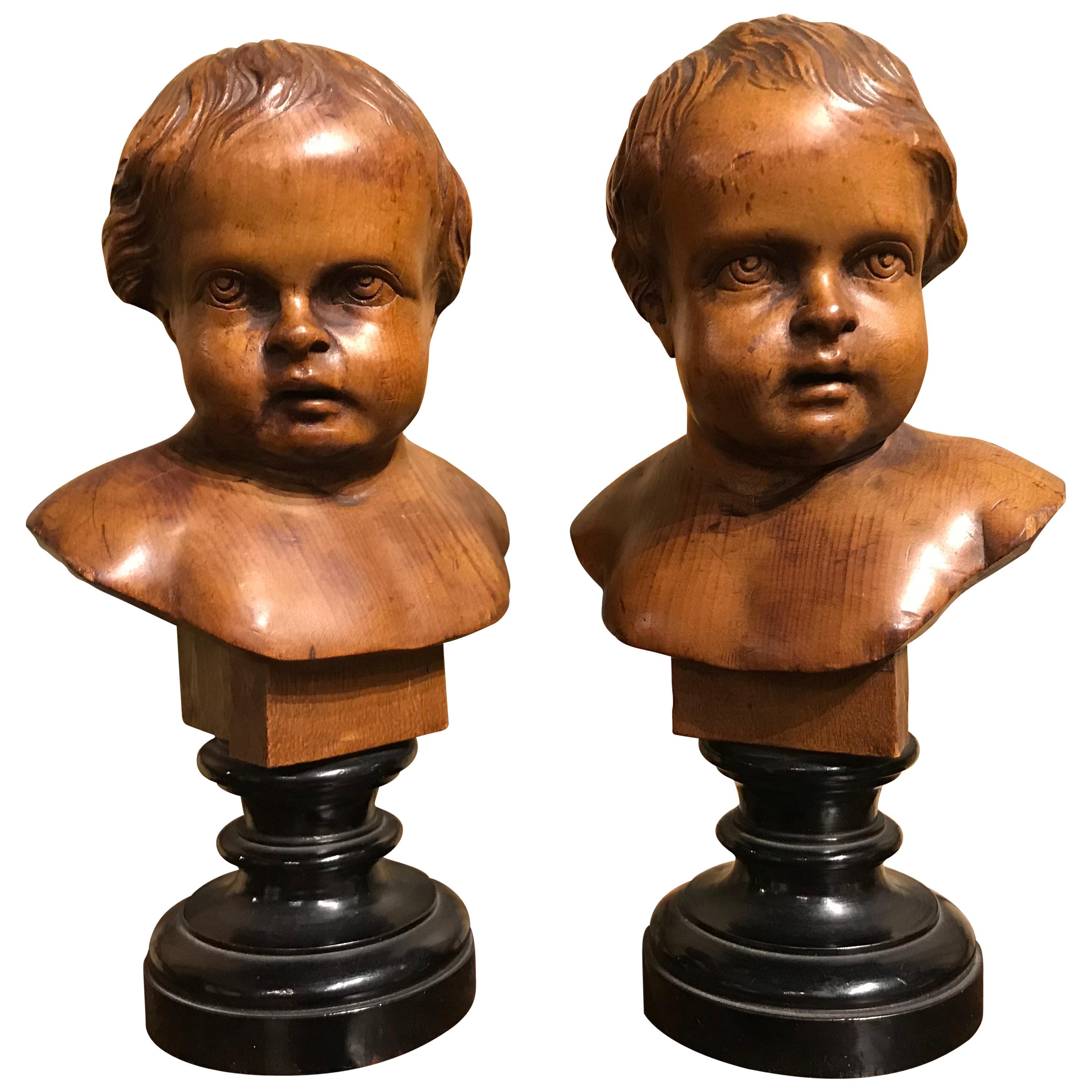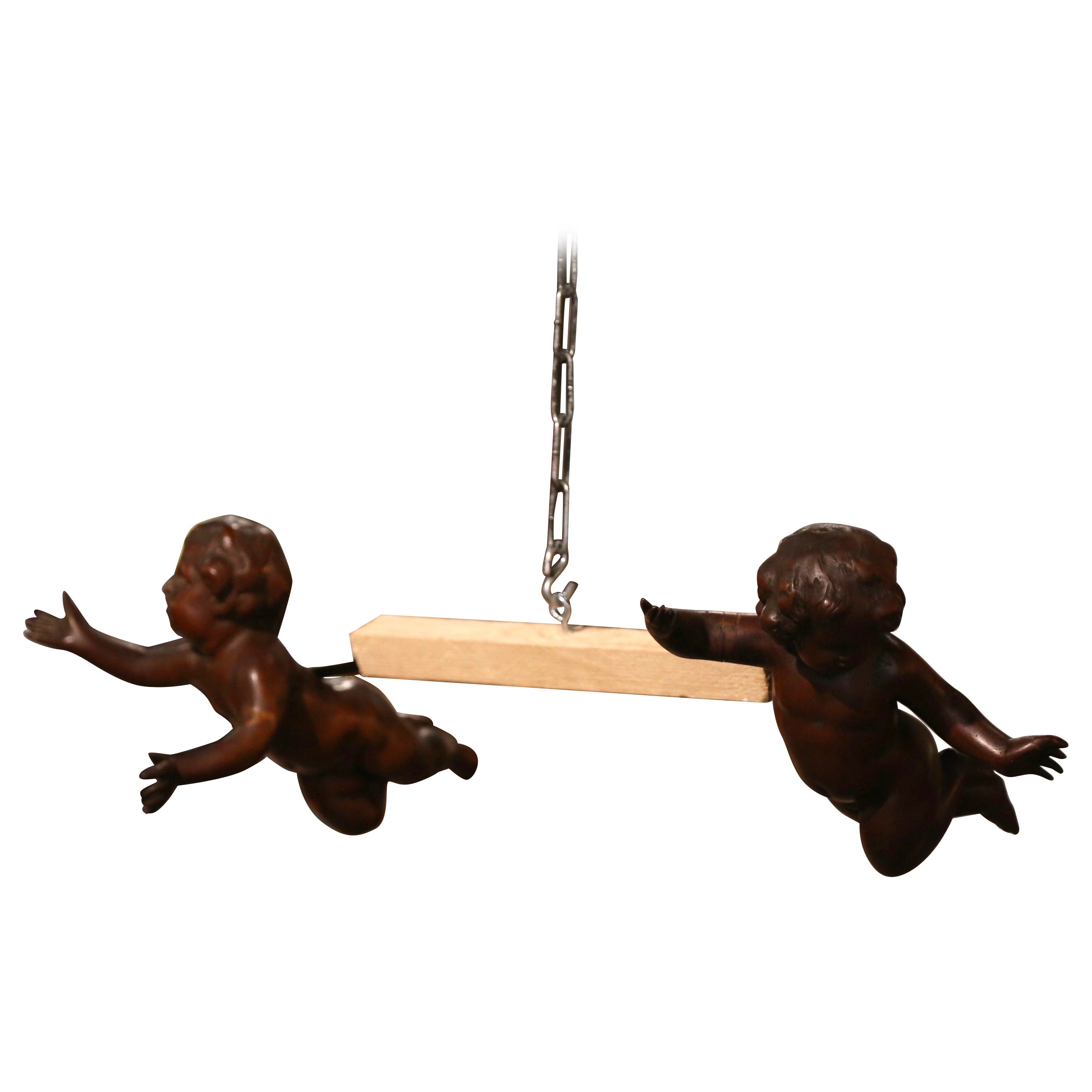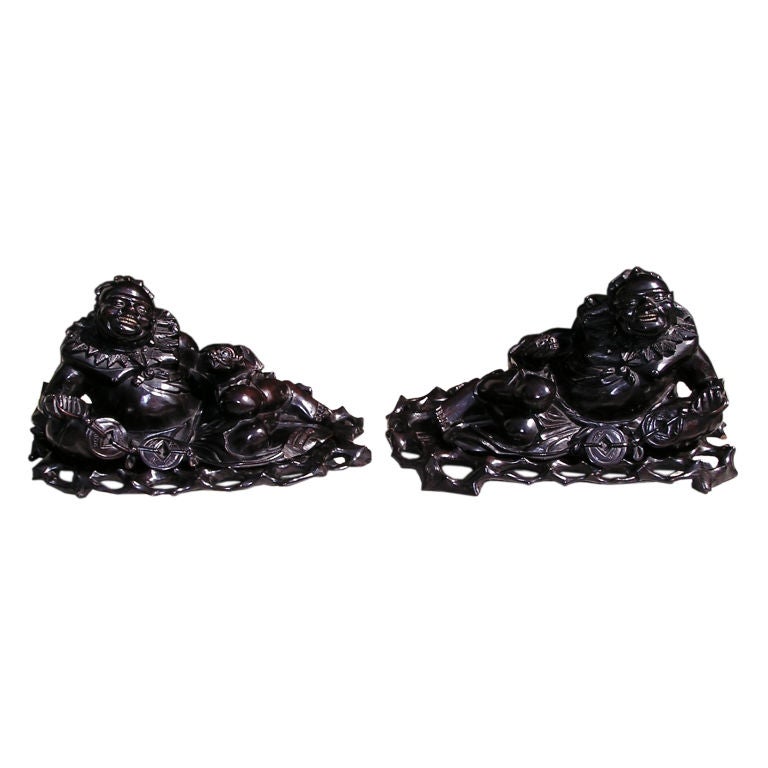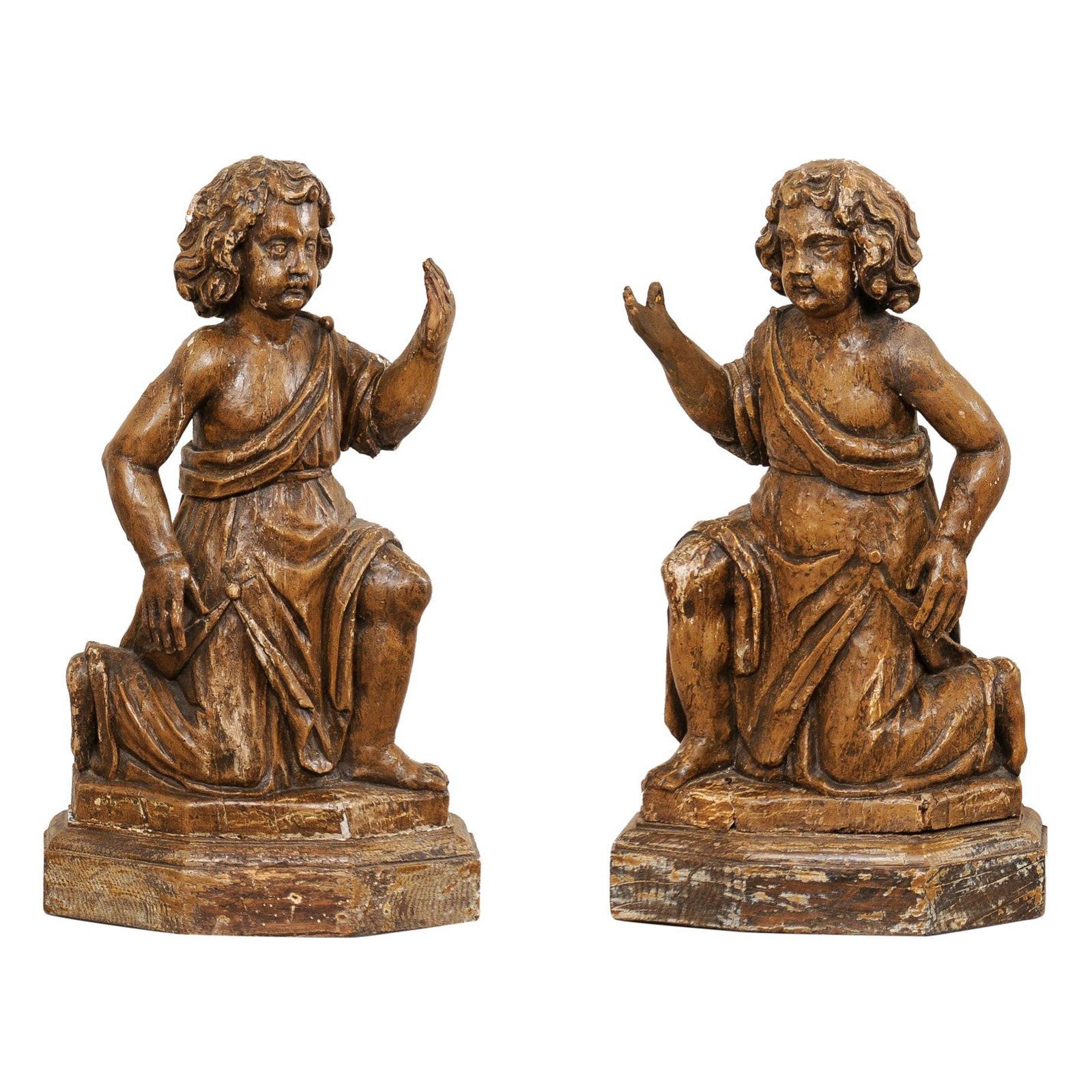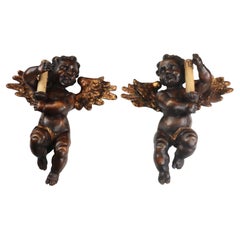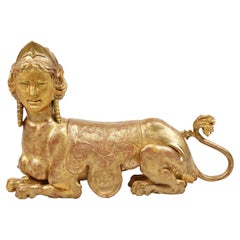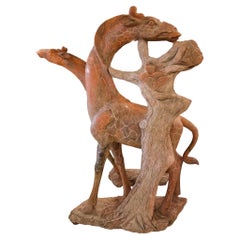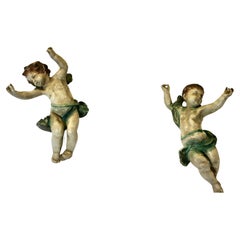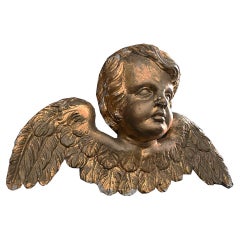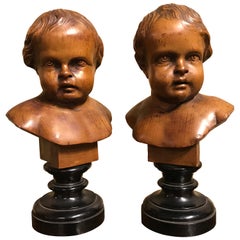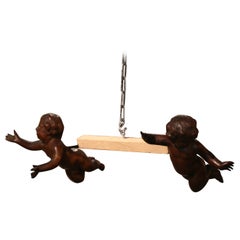Items Similar to Pair of 19th Century Italian Carved Wood Figures of Cherubs/Putti
Want more images or videos?
Request additional images or videos from the seller
1 of 14
Pair of 19th Century Italian Carved Wood Figures of Cherubs/Putti
About the Item
Meticulously carved from beechwood, this cherub pair recalls the iconic Renaissance style of the fifteenth and sixteenth centuries. Better recognized by their Italian name, putti—the singular putto refers to the Latin putus, meaning “boy” or “child”—these types of figures often recur in religious artwork as symbols of God’s omnipresence. Typically depicted as chubby male children and occasionally with wings, the putti motif initially disappeared from art during the Middle Ages. Historians generally attribute its later revival to Donatello, an Italian devoted to classical sculpture who lived in Florence in the 1420s. Under Donatello’s influence, putti became especially known as “musician angels,” and were often painted or carved with instruments. These 19th Century sculptures each hold a tambourine aloft their curled heads elegantly poised as if caught in a musical performance. A close eye will additionally appreciate the gentle curvature of the bodies, almost infantile in their apparent softness, including the dimples that delicately detail the knees and knuckles. Below the putti’s feet, the carving impressively transitions to a matching set of ornate pedestals. Here the artist achieves a notable functional elegance: the detailed scrollwork that so strikingly lifts the putti also forms a sturdily pronged base, conducive to secure placement on any level surface. At just over four feet in height, this Italian Renaissance pair could handsomely frame an entryway.
Each H= 52 in. W= 19 in. D= 19 in., 45 lbs.
- Dimensions:Height: 52 in (132.08 cm)Width: 19 in (48.26 cm)Depth: 19 in (48.26 cm)
- Sold As:Set of 2
- Style:Renaissance (In the Style Of)
- Materials and Techniques:
- Place of Origin:
- Period:
- Date of Manufacture:1920
- Condition:Repaired: Cherub 1: Wood separation near the feet. The scroll leg on the base has been reglued. Cherub 2: The crack in the middle of the tambourine has been reglued. Two jingles are missing. The torso has filled wood holes. The base has separation. Refinished. Wear consistent with age and use. Minor losses. The cherubs are held in place with a wooden center peg, however, they lift off the bases and are not fastened. Although intact, they will require white glove shipping due to their fragile nature from age. Each H= 52 in. W= 19 in. D= 19 in., 45 lbs.
- Seller Location:Chicago, IL
- Reference Number:1stDibs: LU7185234021012
About the Seller
5.0
Gold Seller
Premium sellers maintaining a 4.3+ rating and 24-hour response times
Established in 1964
1stDibs seller since 2022
26 sales on 1stDibs
Typical response time: 1 hour
- ShippingRetrieving quote...Shipping from: Chicago, IL
- Return Policy
Authenticity Guarantee
In the unlikely event there’s an issue with an item’s authenticity, contact us within 1 year for a full refund. DetailsMoney-Back Guarantee
If your item is not as described, is damaged in transit, or does not arrive, contact us within 7 days for a full refund. Details24-Hour Cancellation
You have a 24-hour grace period in which to reconsider your purchase, with no questions asked.Vetted Professional Sellers
Our world-class sellers must adhere to strict standards for service and quality, maintaining the integrity of our listings.Price-Match Guarantee
If you find that a seller listed the same item for a lower price elsewhere, we’ll match it.Trusted Global Delivery
Our best-in-class carrier network provides specialized shipping options worldwide, including custom delivery.More From This Seller
View AllPair of 19th Century Italian Hand Carved Angel Cherub Sconces
Located in Chicago, IL
These excellently hand-carved wooden 19th Century Italian angel cherub sconces were done in the traditional Renaissance style. During the Renaissance period, cherub and angel figural...
Category
Antique 19th Century Italian Renaissance Wall Lights and Sconces
Materials
Gold Leaf
Late 19th Century Live Size Renaissance Revival Italian Figural Carved Sculpture
Located in Chicago, IL
This late 19th-century carved wooden sculpture is a lifesize depiction of a young nobleman of the Italian Renaissance. The piece is made entirely from wood and carved gesso under an ebonized finish, giving it the illusion of an oxidized bronze sculpture. The young man is posed in a classic Contrapposto stance, which is an Italian term that means "counterpoise". This term usually refers to a standing human figure carrying its weight on one leg so that the opposite hip rises to produce a relaxed curve in the body, a dynamic pose that is most associated with Renaissance art. He establishes his stance with a hand on his large belt and one hand in the air holding a torch. This Renaissance revival piece is highly detailed through intricate workmanship, down to the Lion of Saint Mark...
Category
Antique Late 19th Century Italian Renaissance Revival Figurative Sculptures
Materials
Plaster, Wood
Early 19th Century English Regency Greek Revival Gilt Carving of a Sphinx
Located in Chicago, IL
From the 1700s through the early 1800s, European aristocrats developed a fascination with ancient Egyptian culture and design that culminated in a full Egyptian Revival. Prominent figures such as Marie Antoinette and Napoleon Bonaparte commissioned rooms decorated with Egyptian motifs. This cultural moment reflects a fascination with a sophisticated civilization of great artists and pharaohs. The Regency era possessed very little knowledge of the Great Pyramids or hieroglyphics, a quality that lent Egyptian art interpretation a compelling air of mystique.
This English Regency period gilt carving depicts a popular figure of borrowed Egyptian motif: the Sphinx. Recognized among educated circles as a symbol of brilliance in the ancient past, the Sphinx was well-known as a mythological creature who destroys those who failed to answer her riddle. Such a piece as this, excellent in detail and craftsmanship, may have once graced the mantle of a gentleman’s study or been exchanged as a gift between British scholars. The beautiful gold surface has been achieved by an artful combination of gilt and gesso; the art enthusiast will appreciate the intricate texture realized in the carving’s hair and tail as well as the delicate detailing of the saddle.
Borrowing from the Egyptians, the Greeks had their own interpretation of the Sphinx. Greek mythology chronicled the Sphinx as being the daughter of Orthous and Chimera or Laius and attributed the riddles, which she proposed, as having been taught to her by the Muses. Crowned with a Grecian diadem and having a refined expression, she evokes an ancient yet reserved intellect.
For the modern-day enthusiast of classical Greek art...
Category
Antique Early 19th Century English Regency Figurative Sculptures
Materials
Gold Leaf
Pair of 20th Century Life Size Pink Striated Marble Baby Giraffes
Located in Chicago, IL
This extraordinary pair of life-size striated salmon pink marble baby giraffe calves have been hand-carved. Both sculptures were diligently carved from a single slab of marble. The s...
Category
20th Century Chinese Modern Animal Sculptures
Materials
Marble
A Pair of 19th century Neoclassical Style Patinated Bronze Urns
Located in Chicago, IL
A Pair of Circa 1850 Pompeian Neoclassical Patinated Bronze Urns. These beautiful urns have boar's head handles surmounted by double-sided classical male and female mask busts, cast ...
Category
Antique Mid-19th Century Italian Neoclassical Urns
Materials
Bronze
$8,400 Sale Price / set
20% Off
Early 19th Century Italian Walnut Grotto Chair
Located in Chicago, IL
This whimsical 19th-century Venetian grotto chair is carved from gorgeous dark brown walnut. The piece features a large-scale open scallop shell motif on the back and seat, with sinu...
Category
Antique Late 19th Century Italian Rococo Chairs
Materials
Walnut
You May Also Like
A Pair of 19th Century Italian Putti Signed A 2 Baroque figures
Located in Chillerton, Isle of Wight
A Pair of 19th Century Italian Putti Signed A
2 Baroque figures hand made in wood composition and gesso, 2 playful cherubs, they have twin hooks in the back enabling them to be hung...
Category
Antique 19th Century Baroque Figurative Sculptures
Materials
Composition
19th Century Hand Carved Gold Gilt Cherub/Putti Fragment
Located in London, GB
19th century hand carved gold gilt cherub/putti fragment
A high-quality hand carved 19th century gold gilt paint over sectioned pine example. This wonderful piece details realistic human features, which suggests it was carved for a special interior section of sorts. Likely to have been part of a larger collective at some point. It would look delightful and highly decorative positioned over a doorway entrance.
Size in inches: H 10” x W 15” x D 5”
Origin: France
Material: Pine
Date: 1850 - 1880
Completely solid in structure and form without any breaks. Detail loss across the painted surface as shown. We sell antique...
Category
Antique 1850s French Early Victorian Busts
Materials
Pine
Pair 19th Century Baroque Style German Carved Wood Busts of Putti
Located in Stamford, CT
A fine pair of carved fruit wood busts of young boys, or putti, South Germany, late 19th century. The realistically carved faces showing distinct personalities and intense gazes. Mou...
Category
Antique Late 19th Century German Neoclassical Busts
Materials
Fruitwood
Pair of 19th Century Italian Carved Walnut Cherub Wall Sculptures
Located in Dallas, TX
These antique wall cherub figures were crafted in Italy, circa 1880. The hand carved cherubs are expressive in their movement and feature wonderful movement and facial expressions. The religious sculptures are in excellent condition commensurate with age and use, and adorn a rich walnut patina. The wall hanging figures...
Category
Antique Late 19th Century Italian Neoclassical Religious Items
Materials
Walnut
Pair of Carved Hotei Figures. 19th Century
Located in Charleston, SC
Pair of Rare Japanese carved blackwood Hotei figures on base with glass eyes, with animal and coin bag motif. 19th Century
Category
Antique 19th Century Unknown Sculptures
$8,500 / set
19th C. French Hand-Carved Wood Cherub Figures, Beautiful Decorative Objects
Located in Atlanta, GA
A French pair of carved-wood cherub figures from the 19th century. This antique pair of wooden figurines from France have been hand-carved to depict a male child (or putto) with loos...
Category
Antique 19th Century French Figurative Sculptures
Materials
Wood
Recently Viewed
View AllMore Ways To Browse
Wood Frame With Carved Head
Ornate Pedestal
Carved Wood Pedestal Italy
Latin Religious
Ornate Antique Pedestals
Wood Carved Musical
Italian Religious Icon
Ornate Musical Instruments
Painted Tambourine
Reveyrolis Art Deco
Sappho Statue
Shield Of Achilles
Spanish Noblewoman
Spelter Archer
Sphynx Sculptures
St Basil Cathedral
Staffordshire Highlander
Three Graces Statue
